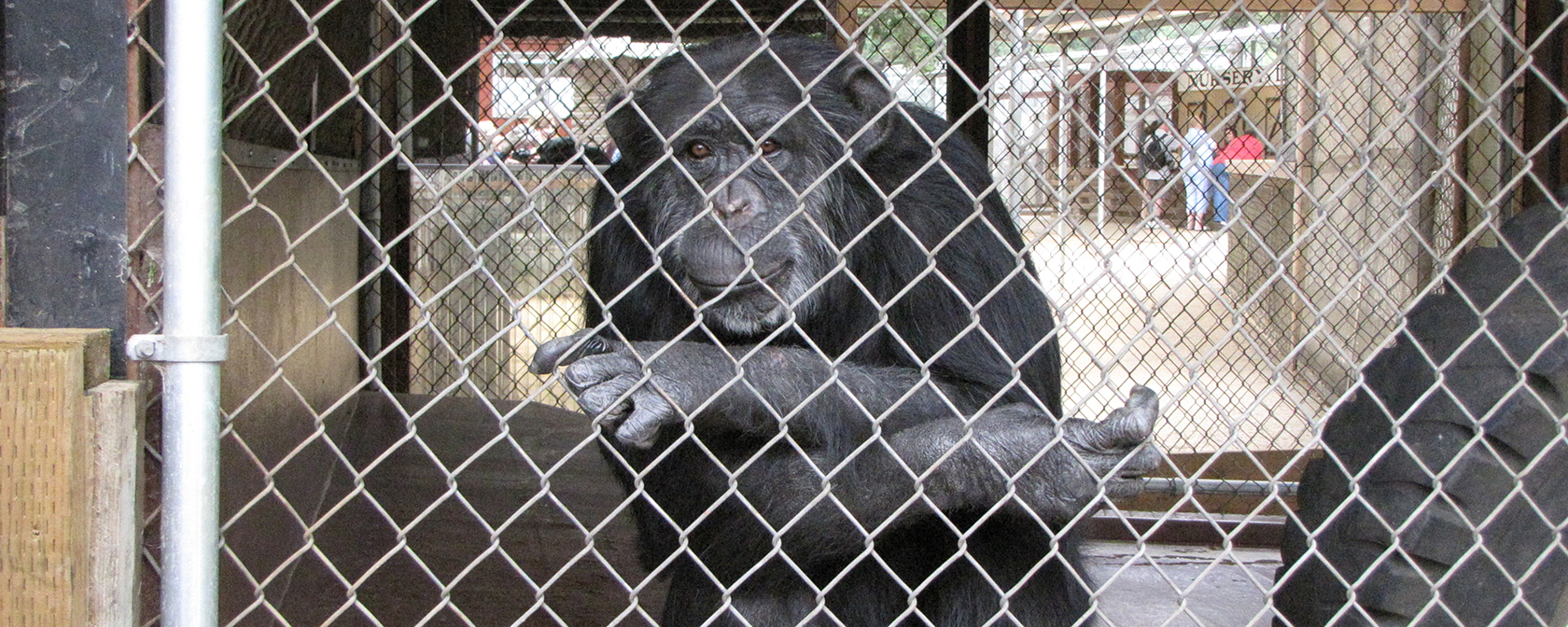By Sara Amundson and Kitty Block
Images of a lion so thin that ribs, spine and hip bones were prominently visible. Inspection reports noting a lioness confined to a dark den with no light, ventilation or bedding, instead an accumulation of water, urine and feces. A male chimpanzee housed in isolation for nearly a year and a half, which must have been a torment for an animal of such a social species.
These are just a few of more than 300 animals who were seized from a roadside zoo in Oregon in May by officials from the Oregon State Police, other state authorities and staff from the Oregon Humane Society. It is because of the work of these professionals that these animals have a chance at better lives.
The raid resulted in 310 animals being transferred from West Coast Game Park Safari in Bandon, Oregon, to reputable facilities to finally get the care they needed. Multiple search warrants and a police investigation into West Coast Game Park’s operations also found on site 80 grams of methamphetamine, 8 grams of cocaine, $1.6 million in cash and 44 firearms, including one weapon modified into a machine gun. The facility’s owner was later arrested. While the dismal facility was shut down, the owner still holds a federal Animal Welfare Act license to exhibit wild animals.
We’re grateful to Oregon authorities for bringing relief to these animals, but these animals should never have been left to languish in such a place. For years, the U.S. Department of Agriculture, which is tasked with enforcing the federal Animal Welfare Act, has documented animal abuse, neglect and cruelty at West Coast Game Park and failed to take any meaningful action. The facility racked up 100 citations for Animal Welfare Act violations, including over 80 from April 2024 to April 2025 alone. According to USDA inspection reports, West Coast Game Park repeatedly had only one staff member to feed and care for more than 300 animals, leaving many without food, water and basic care.
For years, USDA officials documented the poor condition of animals at the facility, and a host of health concerns including parasites, skin, eye and dental conditions. USDA reports also revealed a pattern of bad management that included failure to provide timely veterinary care, improper handling of dangerous animals during public exhibition, sanitation and cleanliness issues, poor record-keeping that hindered efforts to assess the health and well-being of animals, serious rodent infestation, failure to provide potable water, and structurally degraded enclosures.
The operators seemingly didn’t care enough about the animals to keep adequate records of their acquisition, disposition, births or even their deaths. But inspection reports captured a few of the latter. One incident involved improper use of firearms that resulted in the deaths of two bears named Sugar and Spice. Another reported of the story of Wilma, an adult hamadryas baboon, found dead with bite wounds on her body in 2024. A coatimundi was found dead inside her enclosure in January 2025. A tiger had an altercation with a cage-mate, and did not receive veterinary care, and later died. A fishing cat, a medium-sized wild cat native to Asia, fell from a perch, was unable to get up, and eventually died.
The USDA issued official warnings to West Coast Game Park twice, in 2016 and 2023, but never employed the enforcement tools that the Animal Welfare Act gives the agency the power and obligation to pursue in cases like this, including civil penalties, license suspension or revocation, and animal seizures. The federal government failed the animals at West Coast Game Park, and this is a perfect example of why the system must change.
Help animals in roadside zoos by advocating for the Better CARE for Animals Act >>
The Better Collaboration, Accountability, and Regulatory Enforcement (CARE) for Animals Act (H.R.3112/S.1538) provides the solution needed for exactly these types of circumstances. The bill would strengthen the ability of the U.S. Department of Justice to intervene in cases involving welfare violations. The bill would give the DOJ tools to collaborate with the USDA to enforce the Animal Welfare Act and to address a lengthy list of repeat offenders, such as West Coast Game Park, who violate federal law for years with little to no consequence. Much like the West Coast Game Park case, so often we learn that other crimes are committed in conjunction with those against animals, which is exactly why the DOJ must have enhanced opportunities to intervene.
We often hear complaints about burdensome regulations in public life or in commerce, but when it comes to the treatment of animals in captivity, the case is straightforward. They’re entirely at the mercy of humans for nearly every one of their needs. The regulations in place to ensure animals’ basic health and safety simply cannot be dismissed as a burden for operators. The welfare of animals is a public trust, and there can be no room for excuses. As long as they continue to operate, facilities like these must be overseen—for the good of animals. The Better CARE for Animals Act would be a meaningful move in this direction.
It is also important to remember that there are meaningful actions everyone can take against places that mistreat animals for “entertainment.” You can pledge never to buy a ticket to the thousands of places around the world featuring animal rides, petting, selfie-taking and cheap and tawdry performances. During high season for tourism, it’s especially important to be wary of attractions involving animals; so many of these facilities are substandard or outright hellish, subjecting animals to years of mistreatment and little to no veterinary care.
What one person said of West Coast Game Park in August 2023 is something that a visitor to any facility of this kind, anywhere in the world, could say, after making the mistake of buying an admission ticket. “It’s something you walk away from with a disgusting feeling. I wish I never paid to see this; it really hurts your heart.”
The more people avoid these animal attractions, the kinder and more compassionate our world will be. That’s the kind of world we’re trying to build, through kinder policy and better-informed public education and outreach.
Kitty Block is CEO and president of Humane World for Animals.




